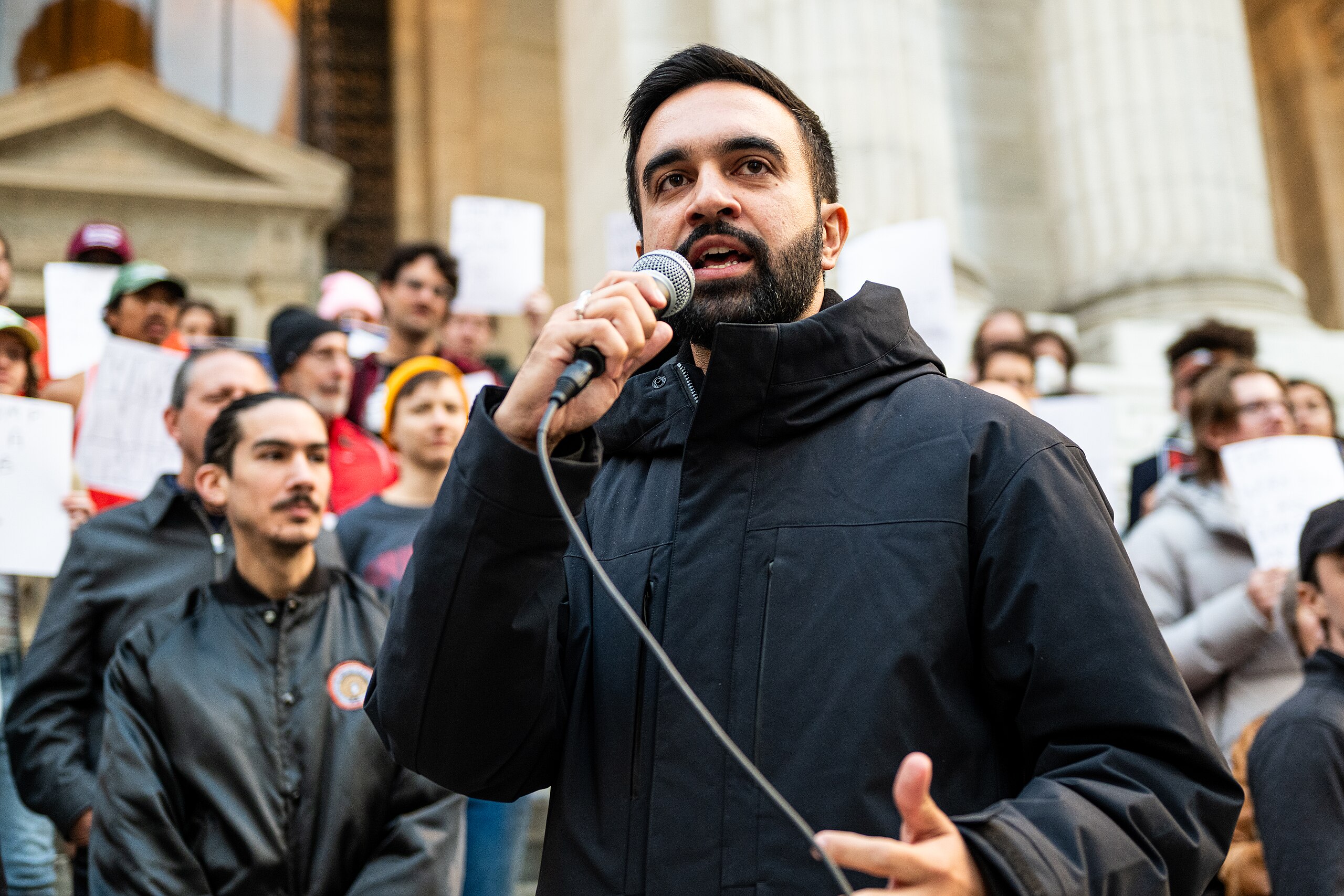Mamdani’s win represents a shift in the status quo, students say
Yalies expressed mixed views, from hope to uncertainty, about the election of Zohran Mamdani for New York City mayor.

Bingjiefu He via Wikimedia Commons
At 9:34 p.m. on Tuesday night, AP News declared that Zohran Mamdani — a democratic socialist state lawmaker from Queens — will be the next mayor of New York.
Defeating former New York Governor Andrew Cuomo, who ran as an independent candidate, and underdog Republican nominee Curtis Sliwa, Mamdani’s campaign focused on mobilizing voters through social media and reducing costs of living.
For 10 students interviewed by the News, Mamdani’s win represents a powerful shift away from the political status quo, for better or for worse.
“I voted for Zohran Mamdani, who is the only major political candidate in my lifetime who seems to acknowledge genuine issues and be looking for solutions to them. It’s the first time I felt like I voted for someone with genuine values who will try to improve things instead of maintaining a failing status quo,” Dash Beber-Turkel ’26 wrote in an email.
According to exit polling from CNN, Mamdani won 78 percent of votes from New Yorkers aged 18-29.
Critics, however, cited inexperience and unfeasible policy proposals as reasons why they were hesitant to support Mamdani’s run. Manu Anpalagan ’26, the president and founder of the Yale College Republicans, wrote in an email that he felt “disappointed by the false promises” Mamdani made “to voters about what he can accomplish.” Anpalagan, who is not from New York City, characterized Mamdani’s messaging as “ingenuine and dishonest.”
Avi Rao ’27, who is from New York but did not vote for Mamdani, said in an interview that he has doubts about many of Mamdani’s policy proposals, since they hinge on increasing tax revenue, which would be dependent on approval from the New York State Assembly.
Ahead of Election Day, a dozen members of Yale College Democrats, or Yale Dems, canvassed for Zohran Mamdani over the weekend. Maryam Abbas ’29, who does not live in New York but canvassed with Yale Dems, observed how many voters expressed their excitement about Mamdani’s policies, citing his plans to make the city affordable. Abbas also mentioned critics she encountered who had less faith in the campaign’s promises.
“There were some people who said, ‘I would never vote for that man, God forbid,’” Abbas noted. “There was one person, for example, who I was talking to, and she said that she likes Zohran’s policies, but she feels like it’s hard to attain his policies.”
Mamdani’s win on the national stage
Many students viewed Mamdani’s win as a promising shift in the overall national Democratic strategy. Brooklyn resident Maya Evans ’27 wrote in an email that she hoped his win would be “a big wake up call to the Democratic Party to get off their ass and do something.”
Yale voters also cited the city’s relationship with President Donald Trump as a factor influencing their vote. New Yorker Manu Bosteels ’28, who is an opinion columnist for the News, wrote in an email that “Cuomo has shown himself to be unwilling to stand up to Trump and indeed takes money and cues from the same people.”
“It’s felt really hard to be living in Trump’s America over the last several months,” Sonja Aibel ’28, who is from Brooklyn and is a copy editor for the News, said in an interview. Aibel said she valued the idea of “local government being a place where the values of that city can be upheld despite what is going on on the national level,” and hoped Mamdani could be a step towards that vision.
Rao, however, expressed concern that Mamdani’s election could bring too much federal focus to the city. Rao described Mamdani’s relationship with Trump as “overly combative.”
“You don’t want to be a collaborator necessarily, but being able to deflect federal pressure and run the city well enough that there isn’t this sort of eye on it, I think that’s the most important,” Rao said.
The future of New York
After Mamdani’s win, voters reflected on the direction New York is now headed. Bosteels praised Mamdani’s campaign strategy as a model for Democrats nationwide, specifically by “using social media effectively and clearly, and being willing to deviate from the stale monotony of mainstream Democratic politics when it matters most.”
Beber-Turkel wrote that Mamdani’s win can signify to the entire country that there is room for more leftist policies within the Democratic party.
“I think his election would signify to the US as a whole that there is a place for real leftism and that the enthusiasm shown for candidates like Mamdani will not automatically transfer to the least offensive elderly, milquetoast neoliberal selected by the DNC,” Beber-Turkel wrote.
Abbas reflected on her enthusiasm at being able to identify with Mamdani, New York’s first Muslim mayor.
“There’s so much excitement, especially as a Muslim, like seeing the Muslim community being really excited about the first Muslim mayor. It’s just so incredible,” she said.
Regarding New York’s relationship with the federal government, Aibel said that she is optimistic about Mamdani’s plans to fight back against pressure from the Trump administration, especially in what she claimed should be a “sanctuary city” for immigrants.
“I am excited about the idea that New York is picking someone who will really stand up to what’s going on outside of New York and will defend the things that make our city special,” Aibel said.
Andrew Bard Epstein GRD ’17, the communications coordinator behind Mamdani’s social media campaigning, graduated from Yale with a doctorate in history.







